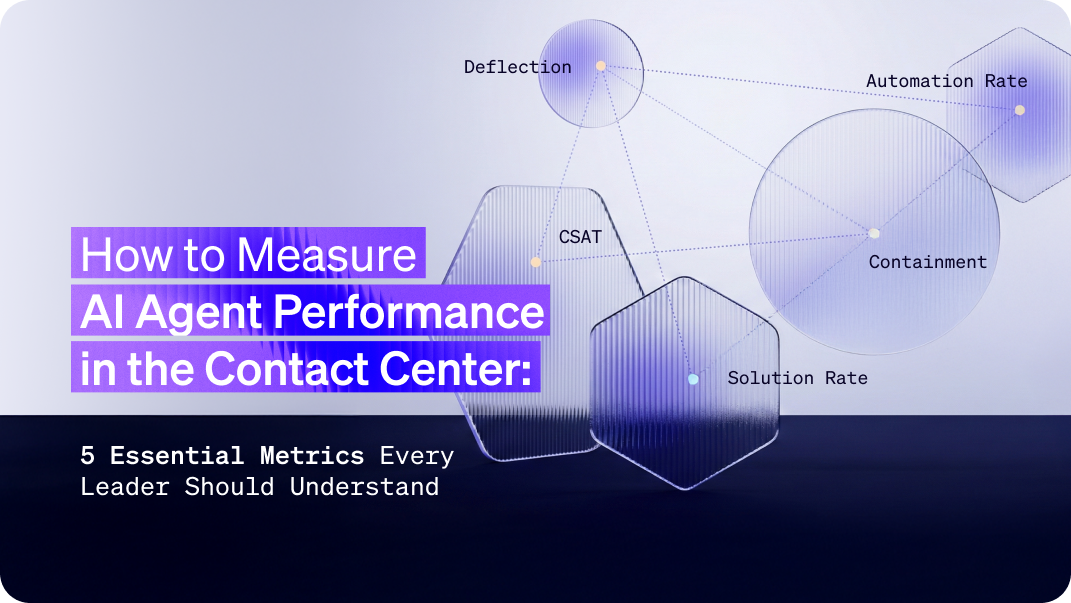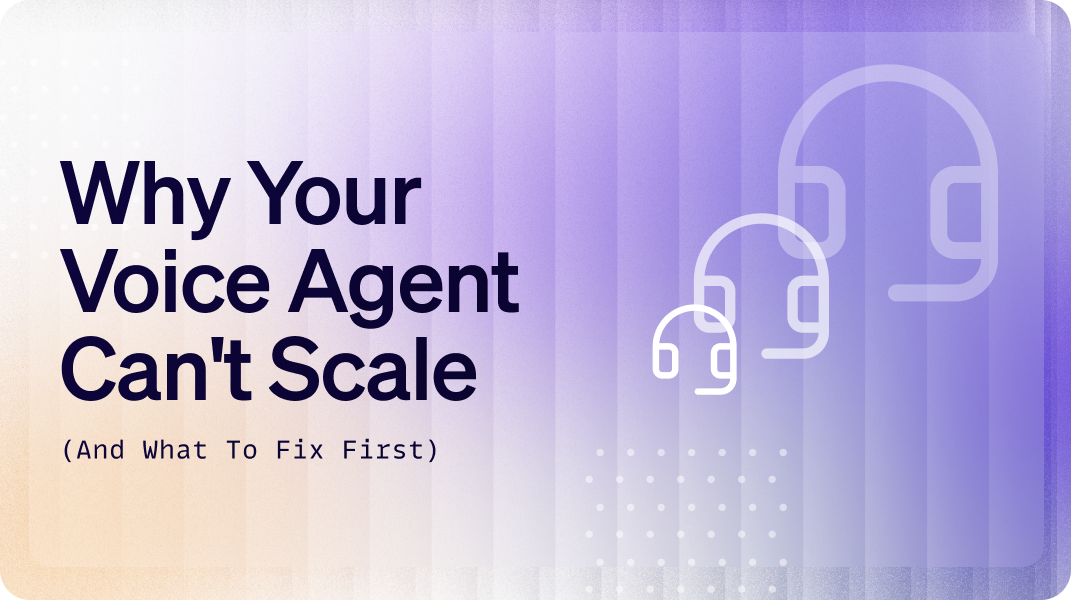Guest expectations continue to rise. They want fast answers, smooth bookings, and support that works on their terms. Long hold times and rigid processes frustrate travelers and put pressure on staff. The hospitality industry is adapting by turning to AI-powered assistants that help them stay responsive without overloading their teams.
AI-powered assistants allow hotels to answer questions instantly, manage reservations with less friction, and support guests across channels and languages. These systems handle repetitive tasks, so staff can stay focused on service that improves the overall guest experience.
In this guide, we’ll examine how conversational AI improves the guest journey, strengthens hotel operations, and helps staff deliver more consistent service.
Why Use Conversational AI in Hotels and Hospitality Settings
Hospitality runs on service, but traditional models depend heavily on in-person staffing-something that’s harder to scale with rising guest expectations and tighter budgets. Conversational AI gives hotels a way to deliver responsive, consistent support at scale, without forcing teams to work around the clock. What follows are the areas where artificial intelligence agents deliver the most value, starting with guest support.
Generative AI-powered automation for faster guest support
Hotel staff spend a significant part of the day answering the same kinds of customer support questions:
- “What time is check-in?”
- “What’s the booking process?”
- “Can I get a late checkout?”
- “Is parking included?”
- “Do you offer airport shuttles?”
- “Are pets allowed?”
AI assistants can respond to these instantly through the website, mobile app, or messaging platform. Instead of waiting in line or holding on the phone, guests get answers immediately.
This kind of automation takes pressure off front desk teams and contact centers, especially during high-volume periods like check-in windows or special events. It also ensures consistent answers every time, no matter who asks or when. And because staff no longer need to triage inquiries, they can stay focused on resolving more complex requests and enhancing customer satisfaction.
Personalized guest experiences and concierge services
A good concierge knows how to read between the lines. The same applies to AI systems that support personalization, except they don’t rely on memory or mood. They learn by analyzing guest preferences, past behaviors, and real-time inputs to recommend the right experience at the right moment.
That might mean:
- Recommending a quiet corner table at the hotel’s restaurant for returning guests who prefer less noise
- Suggesting local attractions based on a guest’s travel history or interests
- Offering late checkout or spa deals based on past booking behavior
When the assistant understands context, the suggestions feel thoughtful rather than generic. Guests don’t have to repeat themselves or scroll through irrelevant options. And over time, these preferences shape how the assistant interacts, adapting its responses based on what works.
This kind of personalization improves engagement and satisfaction. Guests get a smoother stay that feels designed for them, while hotels benefit from higher conversion rates on services, activities, and upgrades the guests actually want.
Streamlined booking and reservation management
Too often, booking a room still feels like filling out paperwork. Pages of dropdowns, limited options, and a long path to confirmation leave guests frustrated or second-guessing. Conversational AI changes the flow. Instead of forcing users to adapt to rigid booking systems, it allows them to ask for what they want and get an accurate response.
Some guests know exactly what they want: a king room, two nights, pet-friendly, with late checkout. Others just want to explore their options and ask follow-up questions. Conversational interfaces can handle both. They guide the guest, confirm details in real time, and adapt when plans change.
For the hotel, this means fewer abandoned sessions and a smoother path to revenue. Bookings become part of a natural conversation (not a separate transactional flow), and guests are more likely to follow through.
Contactless, voice-enabled in-room experiences
Guests expect comfort without complication. With voice-based conversational AI, they don’t need to pick up the phone or navigate apps to get what they want. They simply ask.
Common use cases include:
- Adjusting lights, temperature, or curtains
- Placing room service orders
- Requesting housekeeping or extra amenities
- Getting answers to property-specific FAQs like “When does the spa open?”
When the voice experience connects directly into your operations, the benefit scales across rooms and guest profiles without compromising brand tone or response quality.
Behind the scenes, these systems work through structured, real-time integrations with hotel platforms. Rasa makes this possible through our streaming voice component, which ingests audio streams, performs speech-to-text (STT) conversion with providers like Azure and Deepgram, and routes parsed input into the assistant’s dialogue system instantly, using the same logic stack as text. Output is converted back to speech using text-to-speech (TTS) providers such as Azure or Cartesia, while the response itself is orchestrated by Rasa’s LLM-agnostic runtime.
This setup keeps latency super low, enables full context memory across turns, and ensures hotel teams can plug in their preferred voice stack (bring your own STT/TTS/LLM) while maintaining control over the assistant’s behavior and fallback logic.
Explore Rasa’s voice capabilities for hospitality use cases that blend hands-free comfort with full backend control.
AI-driven multilingual support for international guests
Global travel brings a wide range of languages, and guests expect to be understood without needing to repeat or translate.
- Virtual assistants can carry on natural conversations in dozens of languages
- They handle essential guest questions, from booking details to on-site services, with accurate responses every time
- They reduce dependency on translation tools or multilingual staffing, especially during off-hours
Instead of relying on scripted responses or limited language toggles, hotels can now offer fluid, native-language support across channels. This raises the bar for guest service while increasing operational efficiency.
Take a look at Rasa’s multilingual capabilities:
AI-driven upselling and revenue optimization
Well-timed offers can add to the guest experience instead of disrupting it. AI-powered assistants help strike that balance by watching for the right moments to suggest upgrades, like:
- Enhanced rooms
- Spa access
- Private dining options
Instead of relying on scripted pitches or static promos, these assistants respond in context. When a guest revisits their booking, the assistant can surface a better view or package. If someone asks about restaurant hours, the assistant can follow up with a reservation offer for the in-house chef’s table. That level of responsiveness makes suggestions feel like service, not a sale.
The result is better conversion, higher guest satisfaction, and a smoother way to grow revenue without requiring staff to upsell manually. The logic stays in the background, but the impact shows up in both experience and outcome.
AI-powered workforce support for hotel staff
AI plays a major role in keeping hotel operations running smoothly. By supporting staff behind the scenes, AI assistants help reduce manual workload and keep teams focused on delivering great service.
AI assistants can:
- Route housekeeping and maintenance requests in real time
- Escalate guest issues to the right team members quickly
- Manage internal scheduling or shift updates without human coordination
Some hotels also use conversational AI to assist with:
- Staff onboarding and training
- On-demand access to SOPs and checklists
- Answering internal questions without needing a manager on call
This kind of operational support gives hotel employees more breathing room. Instead of switching between apps, radios, and front desk calls, they get clear, timely direction.
Real-World Use Cases of Conversational AI in Hotels
Hospitality is about consistently delivering an experience at scale, which requires operational systems that can keep pace with each guest’s needs. Conversational AI brings structure to that complexity. Here’s how hotels already use it to strengthen service, simplify logistics, and support every guest touchpoint.
AI-powered virtual concierge services
A virtual concierge can meet guests wherever they are-on their phone, in the lobby, or speaking directly to a voice-enabled device. These assistants handle the kind of helpful, everyday requests that usually pull staff away from other tasks:
- Organizing airport transfers or local taxis
- Recommending restaurants based on dietary preferences
- Offering suggestions for nearby tours, shows, or landmarks
Instead of relying on generic brochures or busy front desks, guests quickly receive relevant recommendations.
Automated check-in and contactless guest experiences
Many hotels have moved check-in away from the counter, but conversational AI makes that transition feel smooth rather than impersonal. Whether through a chat window on a hotel website or a branded mobile app, guests can:
- Confirm bookings
- Update arrival times
- Unlock their rooms
This frees up staff to help with in-person issues, while giving travelers the flexibility to arrive on their schedule. For chains operating at scale, it also improves flow through the property, reducing bottlenecks during peak hours.
AI-powered customer service for loyalty programs
Managing loyalty programs often creates extra friction for guests. Points need to be tracked, promotions surfaced at the right time, and upgrades explained clearly. Hotel chatbots make this more immediate.
Hotels can reduce wait times by enabling communication channels beyond speaking to front desk reps or navigating account portals, with self-service options like:
- Check point balances
- Learn what rewards are available
- Apply promotions directly in conversation
- Make direct bookings
When loyalty feels easy to access, guests stay engaged longer and come back more often.
AI-driven hotel maintenance and housekeeping automation
Guest-facing improvements often get the spotlight, but AI can make the biggest difference in day-to-day efficiency in back-of-house operations. Assistant systems can track room status dynamically, route maintenance requests, and reduce gaps in guest communication across departments.
For example:
- When a guest requests extra towels via chat, the system flags the request and routes it directly to housekeeping, attaching the room number.
- A leaky faucet is reported, so the assistant logs it, notifies engineering, and updates the front desk once it’s resolved
- A room is marked clean and ready, automatically triggering a notification to reservations for faster turnover
All of this happens without manual tracking, sticky notes, or repeated calls between teams. And because the assistant logs every interaction, managers get a clearer view of where improvements are needed.
How Hotels Can Successfully Implement Conversational AI
As demand for instant, intelligent service grows, hotels need AI that fits their operations. Implementation starts with selecting infrastructure that supports your business logic, guest experience, and long-term goals.
Choose an AI solution tailored to hospitality needs
Most generic chatbots fall short in high-touch industries like hospitality. They follow rigid scripts, offer little flexibility in tone or behavior, and struggle to accommodate unique operational flows. That gap becomes more obvious as hotels scale across languages, service tiers, or partner ecosystems.
Hotels need AI agents that can:
- Handle layered, multi-turn conversations with memory and context
- Integrate directly into property management systems, booking engines, and guest-facing apps
- Match the brand’s voice, tone, and standards across regions and languages
- Deliver consistent service whether the guest messages via app, web, WhatsApp, or voice
Rasa provides the framework to support this level of control. Unlike SaaS platforms that force teams to work inside predefined templates, Rasa gives hotels full ownership of their AI stack, including conversation design, backend logic, LLM usage, and deployment environments.
With Rasa, you get:
- CALM (Conversational AI with Language Models) architecture that separates language from business logic so assistants stay reliable in complex, multi-turn conversations
- Built-in support for multilingual assistants without duplicating logic
- Tools to manage performance, train new flows, and version dialogue changes across properties
- The ability to deploy in cloud, on-prem, or hybrid setups
Hotels don’t have to choose between customization and scalability. With Rasa, they can build AI assistants that reflect the brand's personality, automate across touchpoints, and evolve with each new guest interaction.
Explore the Rasa Platform to see how the solution adapts to hospitality use cases across every level of complexity.
Build AI that fits hospitality complexity
AI works best when it frees staff to focus on what people do best: reading tone, handling nuance, and delivering human care. In a hotel setting, that means the AI takes care of repetitive tasks, like answering policy questions or logging simple requests, so your team can give guests their full attention when it matters.
This handoff needs to be seamless. Guests shouldn’t have to explain their situation twice, and staff don’t have time to scroll through disconnected logs or guess at what the assistant tried to do. To make that possible, AI-human collaboration needs three things:
- Shared context across the entire conversation
- Clear rules for escalation that respect both urgency and workload
- Interfaces that equip staff with the right data, not just a message thread
Rasa makes this collaboration frictionless on your terms.
With Rasa, hotels define exactly when, how, and why a conversation moves from an assistant to a human. Escalation logic lives within the assistant itself, tied to policies that account for intent, guest profile, or even the state of the backend system. That way:
- Staff receive structured context
- Escalated conversations maintain memory of prior turns, preserving guest history and progress
- Teams can review how escalations happen and tune those paths over time
Hotels can also set up dynamic handoff conditions. For example, if a guest asks about a cancellation policy, the assistant can handle it. But if they mention a billing issue or submit multiple requests in a short time, the conversation can move to a person with all the right info attached.
This provides guests with responsive support while keeping teams focused on the work that benefits most from human judgment. Because Rasa’s architecture gives you full control over these flows, hotels can fine-tune the experience across service tiers, languages, or properties without needing to rebuild core logic each time.
Prioritize security and data compliance for guest information
Hospitality runs on trust. Every time a guest checks in, books a service, or engages with a hotel’s digital assistant, they share information that needs to stay protected. From payment methods and loyalty accounts to travel preferences and contact details, guest data is foundational to how hotels operate.
AI-powered systems must meet the same security standards guests expect from every other part of the experience. That means:
- Storing and processing data in compliance with global and local regulations (like GDPR)
- Preventing unauthorized access or misuse of guest profiles
- Ensuring transparency about how personal information is used
Rasa gives hotels full control over how data is handled, stored, and secured.
With on-premise and hybrid deployment options, hotels can run their AI stack within their existing infrastructure, keeping all guest data on secure, internal servers. There’s no forced dependency on third-party APIs, no mystery around where data goes, and no risk of losing oversight as systems scale.
Rasa’s architecture supports:
- Fine-grained access controls and audit trails
- Data residency options that meet regional compliance needs
- Configuring data retention, filtering, and masking policies across training pipelines.
- Full observability into how information flows across assistants, backend systems, and human escalations
This ensures guest trust stays intact, even as automation expands. Hotels retain ownership of their systems, workflows, and data, which build intelligent and responsible experiences.
Elevate the Hotel Experience with AI-Powered Automation
Conversational AI lets hotels deliver faster, more personalized service without overextending their teams. From handling guest questions and managing bookings to supporting staff and driving revenue, AI-powered assistants streamline operations where it counts. But the tools behind those experiences matter just as much as the outcomes.
Hotels need reliable assistants built on flexible, secure infrastructure that adapts as needs evolve. With Rasa, teams get an LLM-agnostic platform that supports custom logic, voice and messaging channels, and strict data privacy from the start.
Ready to build AI that fits your brand? Connect with our team.






